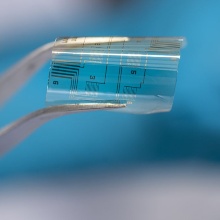A new Research Training Group (RTG) in materials science is to be established at Heidelberg University and the University of Stuttgart. RTG 2948 “Mixed Ionic-Electronic Transport: From Fundamentals to Application” – a programme to promote early career researchers – will be financed by the German Research Foundation with approximately 7.4 million euros over a period of five years. The RTG, with research groups from chemistry, physics and engineering sciences, will explore how ions and electrons interact in organic, hybrid and nanostructured materials and how this interplay can be used for creating new functionalities, for example, in bioelectronics. Spokesperson is Prof. Dr Jana Zaumseil (Heidelberg); co-spokesperson is Prof. Dr Sabine Ludwigs (Stuttgart).
Mixed ionic-electronic semiconductors are materials in which both ions and electrons can move when an electric field is applied. Their properties, for example mechanical or optical, depend strongly on the concentration of ionic and electronic charges and their interactions. For instance, actuators for soft robotics can be produced from polymers with mixed ionic-electronic conduction that change volume and shape depending on the electrical stimulus. Such mixed semiconductors can even mimic the function of synapses for artificial neuromorphic systems, Prof. Zaumseil explains. “For all these applications, a fundamental understanding of the interplay between ions and electrons in these materials is required to be able to tailor their properties. This is the goal of our Research Training Group,” says Prof. Zaumseil, who is based at the Institute for Physical Chemistry of Heidelberg University.
Starting in October this year, two consecutive cohorts of up to twenty doctoral researchers at Heidelberg University and the University of Stuttgart will explore and develop novel mixed ionic-electronic conductors, semiconductors and devices. The experimental work will be accompanied by modelling and simulation from the molecular level to the macroscale. “The combination of fundamental and applied research, close collaboration across disciplines, exchanges with our international partners, and a tailored qualification programme will provide our doctoral researchers with ideal conditions for future careers in this rapidly developing area of research and technology,” emphasises Prof. Ludwigs, who works at the Institute of Polymer Chemistry of the University of Stuttgart.
| Contact | Prof. Sabine Ludwigs, Institute of Polymer Chemistry (IPOC), Chair of Structure & Properties of Polymeric Materials, Tel. +49 711 685 64441 E-Mail |
|---|


